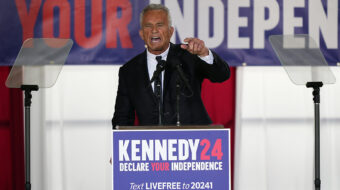
Talking about substantial policy issues that differentiate the candidates this election season has become near-impossible, given the way that character issues (arguably no less substantial) have dominated media election coverage.
If it’s not too late, maybe I can sneak into the mix a human rights issue that is at stake in this presidential election: education.
The United Nations recently released a study supporting the Black Lives Matter movement, recommending reparations for African Americans for the history of slavery. As well, the report identified contemporary violence against African Americans, such as the spate of unpunished police shootings, as human rights violations linked to the legacy of slavery.
But education is another source of persistent violations of human rights in the U.S. — perhaps flying more under the radar — and it desperately needs to be addressed. This presidential election will determine whether this human rights issue has any chance of being addressed by our government.
A human right
Remember the Universal Declaration of Human Rights adopted by the United Nations in 1948? This document declared it every individual’s right to enjoy a quality education without discrimination or exclusion.
Our states have not been so united in delivering on and protecting this right, which is why we need a president who cares about quality public education and a federal educational policy to secure these human rights for American citizens. We heard a lot about educational policy and the need to support and make more accessible quality public education from Bernie Sanders and Hillary Clinton in the Democratic primary; but Trump’s complete lack of interest in public education, except for his interest in ending it, as well as his other many distracting outrages, have kept the issue out of the debates and the general conversation in the presidential campaigns.
Conservative attacks on education
Consider, however, the following:
Last September Judge Thomas Moukawsher of the State Superior Court in Hartford ruled that “Connecticut is defaulting on its constitutional duty” to give all children an adequate education. The state, he observed, was shortchanging the poorer districts, among other deficiencies in the state’s efforts provide equal and quality education to its citizens.
Last February, the Kansas Supreme Court ruled that the underfunding of public education spearheaded by Republican Governor Sam Brownback and the Republican-dominated state legislature violated the state’s constitution. In May, the court ruled again, after the legislature failed to adequately respond to the February ruling, that, “In short, disparities (in funding) among the districts remain inequitable and unconstitutional.”
In 2015, Kansas’ public schools had to end the school year early because Brownback’s huge tax breaks for individuals and businesses, part of his project to gradually eliminate state income tax altogether, decimated education funding. Twin Valley schools closed 12 days early, while other schools also ended the school year prematurely and also cut programs.
New Jersey Governor Chris Christie was similarly rebuked by his state’s supreme court for underfunding public education and ordered to increase funding by 500 million dollars back in 2011.
In my own state of Illinois, Governor Bruce Rauner has been seeking a staggering 31 percent (or $380 million) cut in funding to public higher education. What is more, his refusal to sign a state budget unless the Democratic-controlled state legislature passes union-busting measures he supports has effectively crippled the state university system, leaving at least one state institution’s survival in question. Rauner, of course, followed in the footsteps of his fellow Republican governor to the North, Scott Walker of Wisconsin, who slashed public higher education funding by $300 million two years ago.
I could go on, but the trend is clear. Just as individual states could not be counted on to protect individual’s civil rights, leading to federal legislation during and after the Civil Rights Movement, so we cannot count on states in our nation to ensure and protect the human rights of its citizens, in this case the human right to a quality public education.
We need real policy and investment
We need a comprehensive national education policy as well as federal legislation to guarantee and enforce this human right by, in part, mandating adequate budgeting and insisting education funding be a priority.
Thus far, all signs point to the fact that a Democratic leadership in Washington, D.C. will be necessary to achieve these goals. Texas Governor Rick Perry was clear in his now infamous “oops” moment that he had every intention, if elected president, of dismantling the Department of Education. And in February 2015, during a House Education and Workforce Committee proceeding to re-authorize elementary and secondary education law, Republican Congressional Representative Dave Brat of Virginia asserted, “The greatest thinkers in Western [civilization] were not products of education policy. Socrates trained Plato in on a rock and then Plato trained in Aristotle roughly speaking on a rock. So, huge funding is not necessary to achieve the greatest minds and the greatest intellects in history.”
We can see where this is going. Clearly, we just need a huge rock, not funding.
In other words, the Republican attitude toward funding education is to find reasons not to fund it.
Never mind that we repeatedly hear about the importance of technological literacy for today’s students entering the workforce, or that the digital divide is one of the most pressing social and educational challenges facing our grossly unequal society.
Brat makes it all clear that schools don’t need computer labs. They don’t even really need libraries. They just need rocks—or just one big rock.
I can’t help but hear Malcolm X’s famous words, “We didn’t land on Plymouth Rock. Plymouth Rock landed on us.”
If we don’t want to betray the great experiment those who landed on Plymouth Rock were pursuing and if we don’t want to bury under a big rock countless students seeking a quality education so they can develop and contribute their talents to make our world better place, then we need to see that Hillary Clinton is the only presidential candidate who has talked about supporting public education and making college accessible and affordable for all.
And we also need to see the importance of down-ballot races. Trump is not himself alone the enemy of quality public education. While many in the GOP repeatedly seek to distance themselves from Trump with the hope of distinguishing themselves from him, in fact Trump does largely represent the GOP and the GOP largely supports Trump’s policies.
If we want a nation that protects its children’s and all of our human rights from state leaders like Rauner, Walker, Christie, and Brownback—and the list could go on—the choice is clear.












Comments